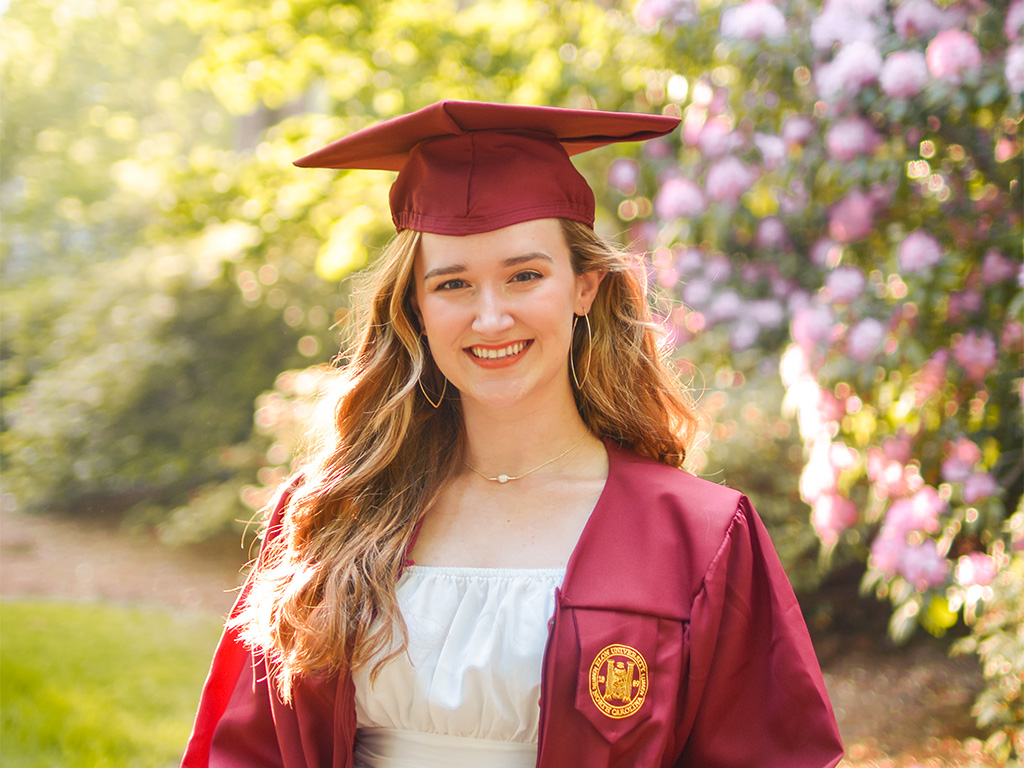In this series, Elon College, the College of Arts and Sciences is shining the spotlight on distinguished members of the Class of 2022 from a wide array of disciplines.
An arts administration major and Multifaith Scholar, Emily Wilbourne pursued interdisciplinary research in Korean religious traditions that was honored with the 2021 Award for Academic Achievement Abroad, a nationally competitive award from the Forum on Education Abroad. She has minors in dance and interreligious studies.
This semester, Wilbourne was a recipient of the PERCS Outstanding Ethnography Award.
Wilbourne’s scholarship and leadership were recognized with inductions into Omicron Delta Kappa, Phi Kappa Phi and Theta Alpha Kappa honor societies. She also was a teaching and learning assistant with Professor of Biology Dave Gammon in SCI 126: Journey Through Time in fall 2020.
How did you select your arts administration major?
I chose this degree to combine my love of the arts with my desire to connect audiences with different kinds of art, both visual and performance.
Tell us about your undergraduate research experience.
As a Multifaith Scholar, I examined the negotiation of religion, tradition, and modernity in a Korean dance called seungmu. Seungmu, translated as “monk’s dance,” was once considered a religious Buddhist dance, but due to many factors including the influence of modernity and the Japanese occupation of Korea (1910-1945), it has been standardized and secularized in the modern-day. In my work, I interviewed contemporary practitioners and masters of seungmu to explore how they perceived seungmu’s status in Korea today.
I was interested in this topic as a means to combine my existing interests in dance, religious studies and Korean culture. I presented the conclusions of my ethnographic and theoretical research at various conferences including the Association for Asian Performance Conference, the American Academy of Religion Southeast Conference, and the Forum on Education Abroad Conference, in addition to Elon’s SURF Day.
Were there faculty you worked closely with? How did their support influence you?
I was co-mentored by two incredible scholars, Dr. Pamela Winfield and Dr. Casey Avaunt. Their endless support and generosity have been the most impactful part of my time at Elon, and no aspect of my research would have been as successful as it was without their mentorship. They have helped me through all of the ups and downs of my research experience and their faith in me to conduct such high-level, significant work has given me a great deal of confidence in myself as a scholar.
What are your post-Elon plans?
I’m planning a career in arts administration with particular interest in facilitating theatre, dance and the performing arts.
As you reflect on your undergraduate years, what’s been most valuable to you? Are there accomplishments you’re particularly proud of?
My participation in the Multifaith Scholars program has been a very valuable part of my undergraduate experience. The benefit of being in a cohort where you are given the resources and support to conduct graduate-level work as an undergraduate cannot be overstated. I have learned so many research skills through my time as a MFS, as well as interpersonal, presentation, writing, ethnographic, and coding skills. I’m incredibly proud of the fact that my article describing my research, fieldwork, and conclusions has been selected for publication by the Journal of Theta Alpha Kappa and will be published in their Fall 2022 publication following the revisions process.
What advice would you give future Elon students?
The most important thing I would tell an Elon student is that you should never put pressure on yourself to try and do everything. You will simply never be able to. Many people may encourage you to join every club, try every class, take part in every on-campus event, or say yes to any and every opportunity that comes your way. This, in my opinion, puts way too much pressure on students and you should instead learn when and where to expend your energy so you don’t get overwhelmed. Use your first year to figure out how you want to sustainably spend your time and energy, and learn how to say no. This will serve you more in the long run.



